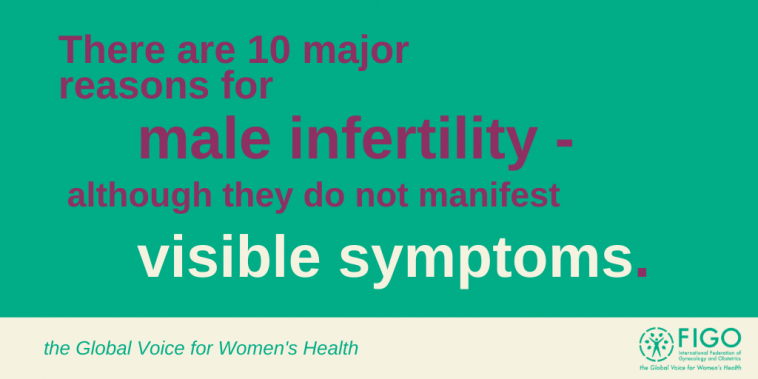10 reasons for male infertility
Often, male infertility is only identified after a couple's persistent, unsuccessful attempts at conception, but there are ten key factors to consider.

FIGO has long endorsed the right of every woman and man to establish a family, as affirmed in the United Nations Universal Declaration of Human Rights.
We also recognise that couples and individuals who desire but are unable to achieve a healthy pregnancy have needs that must be addressed: infertility and subfertility affects an estimated 48 million couples (about 15 percent) of reproductive age worldwide.
There are ten major reasons for male infertility, although they typically do not manifest visible symptoms. Often, male infertility is only identified after a couple’s persistent, unsuccessful attempts at conception.
FIGO’s Committee on Reproductive Medicine, Endocrinology & Infertility emphasises the importance of men taking the following factors into consideration, using preventive measures:
- Obesity: A BMI above 30 can have an impact on sperm quality, because fat deposits can overload and influence the metabolism of androgens (hormones that play a role in male traits and reproductive activity), especially testosterone. This causes significant alterations in sperm development and sperm DNA in the nucleus.
- Smoking and addictive substances: inhaled and addictive substances have a significant, negative effect on sperm because of nicotine and cannabinoid receptors in testicular tissue. Nicotine causes an imbalance in the body which is called oxidative stress; this influences sperm quality and fertilisation potential. Cocaine also distorts sperm development and motility. Stopping smoking and drug use causes reversal of most of the spermatic damages only after several months of discontinuation.
- Radiation: Although there is significant debate in the scientific literature on the impact of mobile phone irradiation on male infertility (only one meta study presented significant data on the effect) it is highly recommended that men do not keep cell phones close to the scrotum and testicles to reduce risk. A less avoidable cause of radiation exposure is cancer treatment such as chemotherapy. In this case, the fertility preservation protocol includes sperm freezing and other advanced methods like testicular biopsy or spermatogonial stem cell extraction and freezing.
- Nutrition: Food rich in antioxidants can help to preserve male fertility. Examples of foods with antioxidant properties include: cheese (vitamin A), oranges (vitamin C), sunflower seeds (vitamin E), fish (Omega 3), broccoli (Folic Acid); beans and artichokes also have antioxidant properties.
- Supplements and steroids: Food supplements should not be used without physician or professional advice regarding impact on health and fertility. Testosterone injections and other steroid preparations can severely harm sperm production. Excess of coffee drinking can also have an influence, particularly if there is an underlying fertility problem.
- High testicular temperature: Male genital organs hang outside the body, in a scrotal sac with a lower temperate compared to intra-abdominal organs. Raising the testicular temperature even 2 or 3 degrees centigrade can compromise sperm quality and functionality. Risk factors may include work in high temperature professions; professions with long hours in a seating position; tight underwear and use of laptops help on the lap for a long period of time.
- Infections: It is well known that Sexually Transmitted Infections (STIs), including gonorrhea, chlamydia and ureoplasma can cause male infertility. Genital inflammation produced by these microorganisms contribute to the changes in sperm quality, while severe and chronic cases of these infections can cause obstruction. Any sign of infection should be diagnosed and treated aggressively with antibiotics.
- Genital injuries: Testicular injuries should be treated without delay. Men should take extreme care during sports in which testes are not properly protected, including include martial arts, cycling, horse riding.
- Varicocoele: This is enlargement of the veins in the scrotal sack, which raises the temperature of the testes and influences sperm production and quality. Testing and treatment for this condition is a standard part of male infertility investigation.
- Age: The assumption that men can reproduce into advanced age is totally untrue. After 35, the reproductive potential of men drops sharply, as DNA in the nucleus fragments. After the age of 40, the likelihood of men fathering a child without genetic mutations declines 11 percent every year. Children with fathers older than 50 are significantly more likely to suffer from conditions including Down Syndrome, Neurofibromatosis, Autism and Kleinfelter Syndrome.
The field of reproductive medicine and endocrinology is rapidly growing. Integrating fertility awareness, education and care into other reproductive health programmes can help transform family planning into the planning of a family, as and when individuals choose.
FIGO’s Committee recommends that every man planning conception with his partner engage with fertility planning, including a sperm analysis and culture, in order to avoid delays and frustrations in the future.